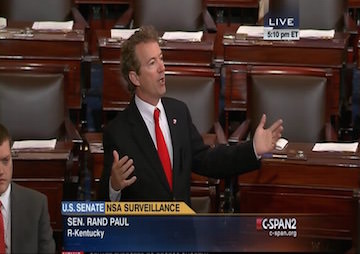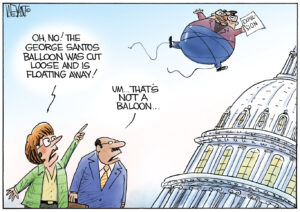Senate Debates Patriot Act and NSA Reform
UPDATE: A heated Sunday Senate session has failed to produce an eleventh-hour extension of the controversial Patriot Act. The Senate will vote on a revised version of the Freedom Act, a bill aimed at ending the controversial bulk collection of telephone metadata, on Tuesday. C-SPAN
C-SPAN
C-SPAN
UPDATE: A heated Sunday Senate session has failed to produce an eleventh-hour extension of the controversial Patriot Act. The Senate will vote on a revised version of the Freedom Act, a bill aimed at ending the controversial bulk collection of telephone metadata, on Tuesday.
The Senate showdown’s most prominent voice has belonged to Sen. Rand Paul, who vowed to force the end of the controversial legislation.
READ: Rand Paul Got One (Huge) Thing Right
In a lively debate with fellow Republican John McCain, the Kentucky senator led the attack on what he has termed “Barack Obama’s illegal government surveillance.”
“This is what we fought the revolution over? Are we going to so blithely give up our freedom? … I’m not going to take it anymore,” Paul announced on the Senate floor, as supporters wearing “Stand With Rand” T-shirts filled the spectator gallery.
Despite making the point that an extension of several of the Patriot Act’s powers is “vitally important,” Democrat Harry Reid condemned Mitch McConnell for “not having a plan.” Referring to Paul, Reid said, “I disagree with the junior senator from Kentucky, but we’re not in the mess we’re in today because of the junior senator from Kentucky, we’re in the mess that we’re in today because of the majority leader” (McConnell).
Last week, a House bill failed in the Senate by a mere three votes, with Paul obstructing McConnell’s efforts to reauthorize the Patriot Act without any changes.
The path to passage for any bill that would reauthorize Patriot Act provisions now seems improbable.
The bill is likely to have a final vote Tuesday.
Here’s what will happen if the Patriot Act ends tonight, as USA Today explains:
• The “lone wolf” provision of the law will expire. This allows U.S. intelligence and law enforcement agencies to target surveillance at suspected terrorists who are acting alone without any direct ties to terrorist groups or rogue nations. It specifically says that it does not apply to U.S. citizens.
• The “roving wiretap” provision will expire. This allows federal agencies to monitor a person rather than a specific phone or electronic device. The government can keep track of suspected terrorists regardless of how many cell phones they use and throw away. Approval for the surveillance must be obtained from a federal court.
• Section 215 of the Patriot Act will expire. This section has generated the most controversy and debate because the National Security Agency has used it as the basis to collect the phone records of millions of Americans not suspected of any crime. Many members of Congress would like to see this section changed or repealed.
• Lesser-known powers under Section 215 will also end. While the mass collection of phone records by the NSA has been the focus of attention, this section of the law is also used by the FBI and CIA to collect other information. For example, the CIA uses it to track financial data, such as wire transfers, that can help expose terrorist networks. The FBI has used it to obtain companies’ Internet business records.
• Investigations of phone records under Section 215 of the law will not stop immediately. A clause in the Patriot Act allows the NSA to continue investigations it has already started. The agency collects data that shows who made and received calls, how long those calls lasted and when they took place. The data does not include the substance of those calls.
WATCH: The live debate on C-SPAN here.
An earlier version of this piece erroneously said the Senate passed the USA Freedom Act.
–Posted by Roisin Davis
Your support matters…Independent journalism is under threat and overshadowed by heavily funded mainstream media.
You can help level the playing field. Become a member.
Your tax-deductible contribution keeps us digging beneath the headlines to give you thought-provoking, investigative reporting and analysis that unearths what's really happening- without compromise.
Give today to support our courageous, independent journalists.






You need to be a supporter to comment.
There are currently no responses to this article.
Be the first to respond.